Summary
March 2023 — This second webinar in the Clean Energy Funding Series focuses on empowering local governments, tribes, schools, and nonprofits to access funding successfully so that Wisconsin can prosper in the transition to the clean energy economy. Our expert panelists inform you of current Federal and state grants, payments, and financing opportunities and what you can do to prepare to apply for them.
Webinar Recording
Presenter Slides & Resources
Resources from US Department of Energy
- OECC’s Federal Funding
- Summary of Investment Tax Credit (ITC) and Production Tax Credit (PTC) Values Over Time
- Prevailing Wage & Apprenticeship Information
- FACT SHEET: President Biden’s Budget Lowers Energy Costs, Combats the Climate Crisis, and Advances Environmental Justice
- FACT SHEET: Biden-Harris Administration Advances Cleaner Industrial Sector to Boost American Manufacturing and Cut Emissions
- FACT SHEET: Biden-Harris Administration Announces New Standards and Major Progress for a Made-in-America National Network of Electric Vehicle Chargers
- DOE’s New Clean Energy to Communities (C2C) Program – Technical Assistance
- White House Highlights Infrastructure Progress in Every Corner of the Country, Updates State-by-State Fact Sheets
- How to Engage with Treasury on Clean Energy Tax Incentives
- STATE FACT SHEETS: How the Inflation Reduction Act Lowers Energy Costs, Creates Jobs, and Tackles Climate Change Across America
- Homeowner’s Guide to the Federal Tax Credit for Solar Photovoltaics (also in Spanish)
- Federal Solar Tax Credits for Businesses
- Federal Tax Credits for Solar Manufacturers
- How the Inflation Reduction Act Impacts Solar Deployment and Expands Manufacturing (including slides)
- Energy Saver Guide
- Updated Weatherization Assistance Program (WAP) Fact Sheet
- IRA – Clean Energy for All
- BIL – Building a Better America
- Rural Opportunity Tour Fact Sheet
- DOE Equity Action Plan
- DOE Clean Energy Corps
- Database of State Incentives for Renewables & Efficiency® – DSIRE
- Justice 40 Resources
- A letter from Secretary Granholm on the Department’s commitment to Justice40 implementation
- ICYMI: Justice40 Kickoff Webinar Recording
- J40 general guidance document
- Justice40 covered programs list
- The DACs Reporter tool, which allow users to explore and produce reports on the census tracts DOE has categorized as DACs
- Climate and Economic Justice Screening Tool (CEJST)
- Justice40 Fact Sheet
- Energy Justice Mapping Tool
Resources from Wisconsin Office Sustainability and Clean Energy
Resources from Dane County Office of Energy & Climate
Resources from Focus on Energy
- Energy Efficiency and Renewable Energy Incentives for Schools and Governments
- Interactive Tool to find the Energy Advisor in Your Area by Business Type
- An Interactive Tool to find a Focus on Energy Registered Trade Ally in Your Area
- List of Events and Trainings by Focus on Energy
- Financial Resources available to Wisconsin Customers
Resources from UW-Madison Extension/Energy On Wisconsin
- 179D Commercial Buildings Energy-Efficiency Tax Deduction for Public Schools
- Learn how school districts can take advantage of the 179D tax deduction.
- Energy Efficiency and Renewable Energy Resources for State and Local Leaders
- This resource guide highlights resources and publications from the State and Local Solution Center website and across US DOE’s Energy Efficiency & Renewable Energy (EERE) programs.
- The State and Local Planning for Energy (SLOPE) Platform
- SLOPE’s groundbreaking Scenario Planner allows users to visualize scenarios for future energy consumption, CO2 emissions, and system costs of a selected state or county. The Platform also features SLOPE Stories, which provide real-world examples of how states and local governments are using SLOPE to better understand their energy use and clean energy potential. SLOPE’s Data Viewer integrates energy and environmental justice-related data and projections for the cost and performance of key efficiency technologies.
- Energy Savings Performance Contracting for Small Projects Primer
- US DOE, May 2021 highlights strategies and case studies for implementing Energy savings performance contracting (ESPC) in smaller towns, rural counties, and small school districts to complete energy upgrades and maximize energy and cost savings without straining local budgets.
- Achieving Energy Savings in Small- and Medium-Sized Public Facilities: A Strategic Approach to Prioritizing and Financing
- This resource can help state, local government, and K-12 school staff managing small- and medium-sized facilities to strategically prioritize and finance energy-saving projects.
- Better Climate Challenge
- US DOE, February 2022, invites organizations to set ambitious, portfolio-wide greenhouse gas emission reduction goals. This new challenge provides additional opportunities for peer exchange and technical assistance to meet the urgent call to mitigate the impacts of climate change.
- Clean Energy for Low Income Communities Accelerator (CELICA) Toolkit
- Developed from a voluntary partnership between the U.S. Department of Energy (DOE) and state and local governments to lower energy bills for low-income communities.
- Energy Justice Mapping Tool for Schools
- A tool to explore and produce reports for individual school facilities based on several metrics. Tutorial video YouTube
- The Financial Case for Zero Net Energy Schools
- Getting to Zero is a brief on the cost associated with zero net energy schools.
- Financing Efficient and Healthy Retrofits for high performance schools
- US DOE website of resources features solutions to access capital and financing energy-efficiency projects in schools.
- Efficiency-As-A-Service
- Learn how to implement efficiency projects with no upfront capital expenditure
Related Resources
The Midwest Renewable Energy Association (MREA), promoting clean energy, energy efficiency, and sustainable living since 1990, manages the Solar on Schools (SOS) Program, funded by the Couillard Solar Foundation (CSF). The CSF promotes the expansion of solar energy in Wisconsin through partnering with renewable energy focused, Wisconsin-based organizations, and since 2019 has provided grants to support 27 solar school projects.
Solar on Schools Case Studies, Program Contact, and Grant information is available on the MREA Solar on Schools website.
Here are some Solar on Schools CASE Studies:
Generation 180’s Solar School Campaign Toolkit is another great resource for schools in the process of investigating solar procurement.
Energy Efficiency and Renewable Energy Resources for State and Local Leaders May 2022–May 2023. This resource guide highlights resources and publications from the State and Local Solution Center website and across US DOE’s Energy Efficiency & Renewable Energy (EERE) programs.
The State and Local Planning for Energy (SLOPE) Platform SLOPE’s groundbreaking Scenario Planner allows users to visualize scenarios for future energy consumption, CO2 emissions, and system costs of a selected state or county. The Platform also features SLOPE Stories, which provide real-world examples of how states and local governments are using SLOPE to better understand their energy use and clean energy potential. SLOPE’s Data Viewer integrates energy and environmental justice-related data and projections for the cost and performance of key efficiency technologies.
Energy Savings Performance Contracting for Small Projects Primer, US DOE, May 2021 highlights strategies and case studies for implementing Energy savings performance contracting (ESPC) in smaller towns, rural counties, and small school districts to complete energy upgrades and maximize energy and cost savings without straining local budgets.
Our Presenters
Rose Dady, US Department of Energy, Midwest Regional Intergovernmental and External Affairs Specialist
Rose Dady is a Regional Intergovernmental and External Affairs Specialist for the Midwest, in DOE’s Office of Congressional and Intergovernmental Affairs. Rose Dady was most recently Director of Grants Administration for the Wayne County Sheriff’s Office in Detroit, Michigan. She has dedicated her career to implementing grassroots solutions for marginalized groups throughout the state of Michigan, specifically in translating organizational objectives into actionable plans. She is known for building coalitions to develop more resilient communities with equitable opportunity and access.
Maria Redmond, Wisconsin Office of Sustainability and Clean Energy, Director
Maria serves as the Director of the Wisconsin Office of Sustainability and Clean Energy and has worked for the State of Wisconsin for 22 years. In addition to helping with the development and implementation of the recommendations from the Governor’s Task Force on Climate Change, Maria is leading the implementation of the state’s first ever Clean Energy Plan. The plan is centered on environmental justice, creates a pathway to multi-sector deep decarbonization and a bustling clean energy economy that supports a diverse workforce and technology innovation. Maria is a Certified Public Manager, holds a BA in Psychology and a Certificate in African Studies from UW-Madison.
Melanie Askay, Dane County Office of Energy & Climate, Climate Specialist
In her role as Climate Specialist, Melanie is focused on implementing the recommendations set forth in Dane County’s Climate Action Plan. She has over ten years of experience facilitating global and regional natural resource management across nonprofit, government, and business. Prior to joining Dane County Melanie was in California where she focused her efforts on land and water conservation statewide through grants and policymaking. Melanie has a Master’s of Science from Illinois State University and a Bachelor’s Degree from the University of Delaware.
Heather Feigum, Focus on Energy, Agriculture Program and Schools & Government Program Manager
Heather has 15 years of experience having managed energy and project management teams in school districts and as a Focus on Energy Advisor for Schools and Government facilities. Heather began her energy explorations working as a Renewable Energy Researcher at Minnesota State University at Moorhead while getting her bachelor’s degree in Physics with an emphasis in Business. She attained her Masters in Renewable Energy Science with an emphasis on Energy Systems and Policies from the University of Iceland. Heather is a Certified Energy Manager and Certified Performance Contracting & Funding Professional accredited by the Association of Energy Engineers.
Our Moderator
Sherrie Gruder, LEED AP, UW-Madison Extension, Sustainable Design & Energy Specialist
Sherrie provides statewide education and technical assistance on sustainable community development, sustainable energy strategies, and green building to support the resilience and economic vitality of Wisconsin communities, local governments, tribes, and businesses. She delivers the Energy On Wisconsin newsletter, web site and education programs. She authored the Solar Energy Financing Guide: Empowering Wisconsin Local Governments and assists them with energy and resilience planning and how to profitably and effectively meet their energy independent community goals.
Clean Energy Funding Series
Substantial federal funding to spur America’s transition to a clean energy economy will be available over the next few years as a result of the Bipartisan Infrastructure Law (BIL) and the Inflation Reduction Act (IRA). The funding for energy efficiency, renewable energy, clean energy jobs and technologies, clean transportation, and energy equity will be more accessible to a wider range of sectors than ever before. This webinar series on clean energy funding is designed to ready each sector in Wisconsin to take advantage of the opportunities that are or will be available so that you can prepare effectively to bring that money to your projects. You will learn about:
- Federal and state funding opportunities available now and in the future
- Using other federal and state financing and tax incentives in conjunction with federal grants
- Preparing to apply – what you need to do
- Accessing resources to assist
Bringing in funding will accelerate the return on investment of your clean energy project and help you earn savings sooner, while speeding up your progress toward resilience, energy independence, and carbon neutrality. This series will help you navigate the landscape of grants and finance opportunities to move forward on obtaining funding for your project.




























 Equity / Justice40: Clean Energy Funding Series
Equity / Justice40: Clean Energy Funding Series Clean Transportation: Clean Energy Funding Series
Clean Transportation: Clean Energy Funding Series Business & Workforce Development: Clean Energy Funding Series
Business & Workforce Development: Clean Energy Funding Series


